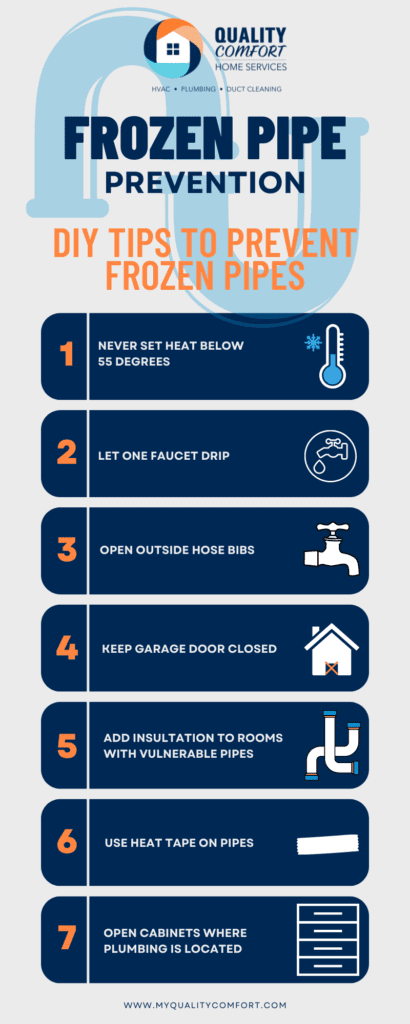Depending on where you are in the country, winter can mean some extremely cold temperatures. With those freezing temps comes an increased risk of your plumbing pipes freezing up.
First, how to know if your pipes are frozen
- Lack of running water – water is unable to stream out of faucets
- Bulging pipes
- Gurgling sounds coming from the pipes/faucets
- Visible condensation on the outside of pipes
- Water is smelly
Finding which pipe is specifically frozen is also important. Be sure to turn on all the faucets one at a time. If nothing comes out, then it is most likely the pipe located closest to that faucet that is frozen.
Now the question is, will the pipes thaw on their own and can they thaw without bursting? The answer is yes, pipes can thaw on their own without bursting. However, it is preferred that you intervene in the thawing process in order to speed it up. Left unaided, the pipes may take anywhere from days to weeks to thaw depending on the temperature outside. This increases the risk of the pipes bursting. There are many DIY frozen pipe thawing methods you can try at home.
How to thaw frozen pipes DIY
- Let the hot water faucet run
- Use a space heater near the frozen pipes (remember do NOT leave the space heater unattended)
- Apply heat tape to the affected pipes
- Wrap steamed towels around frozen pipes
So, how long does it take pipes to unfreeze? About 30 minutes using any of the methods we mentioned above. If you have no running water whatsoever and cannot even get the faucet to drip, it is recommended to go ahead and call for plumbing service ASAP.
Better than having to thaw frozen pipes, there are ways to prevent them from freezing in the first place.
How to prevent frozen pipes
- Never set the heat lower than 55 degrees inside the home
- Let one faucet drip when temps drop below freezing
- Open outside hose bibs so water can drain
- Add wall insulation where necessary so the temperature stays higher in those areas
- Open kitchen and bathroom cabinets to allow warmer air to circulate around the plumbing
- Insulate especially vulnerable pipes
- Keep the garage door closed, especially if there are water supply lines in the garage
- Use heating tape
READ MORE: Full guide on how to prevent frozen pipes
What if the pipe bursts?
Despite your best efforts, the frozen pipe may still burst. If this happens the first thing you need to do is turn off the main water valve. The second thing you’ll need to do is call an emergency plumber. While you’re waiting on the plumber, be sure to move any items away from the water so they are not damaged. You can begin drying up the water with towels, mops, etc. while you wait for plumbing service to arrive.
Once the mess is all cleaned up and the pipe is repaired, ask your local HVAC company or maybe even your plumber what options are available to reduce the risk of developing mold in the area where the water was sitting. This is especially important if there was a large amount of water sitting in a carpeted area or other space in the home where water can be easily trapped.
If you have frozen pipes and are in need of a plumber near Cincinnati or anywhere in Southwest OH, contact Quality Comfort Home Services!


